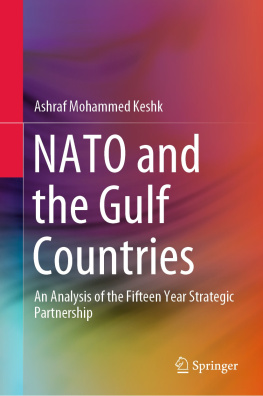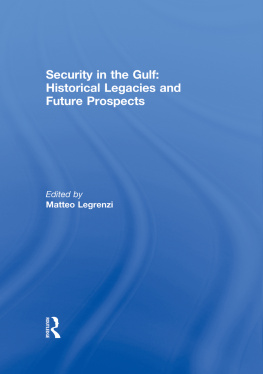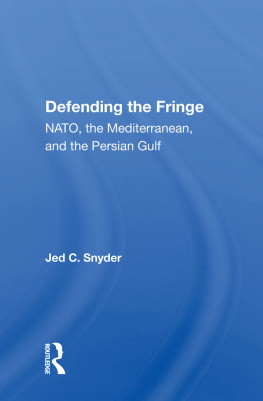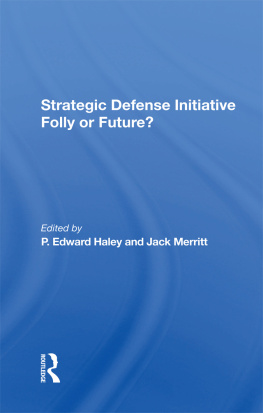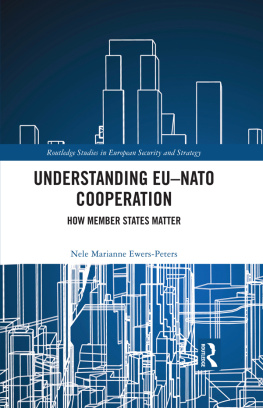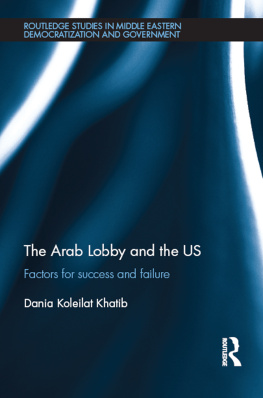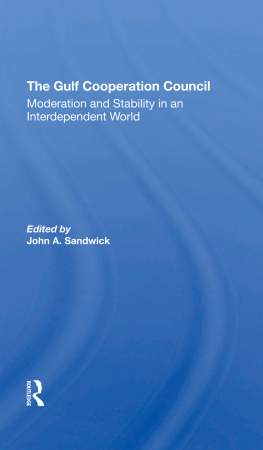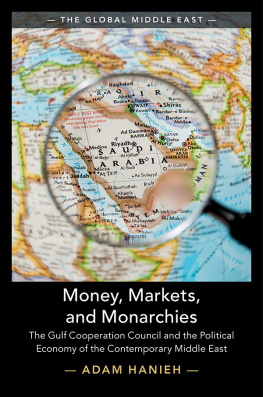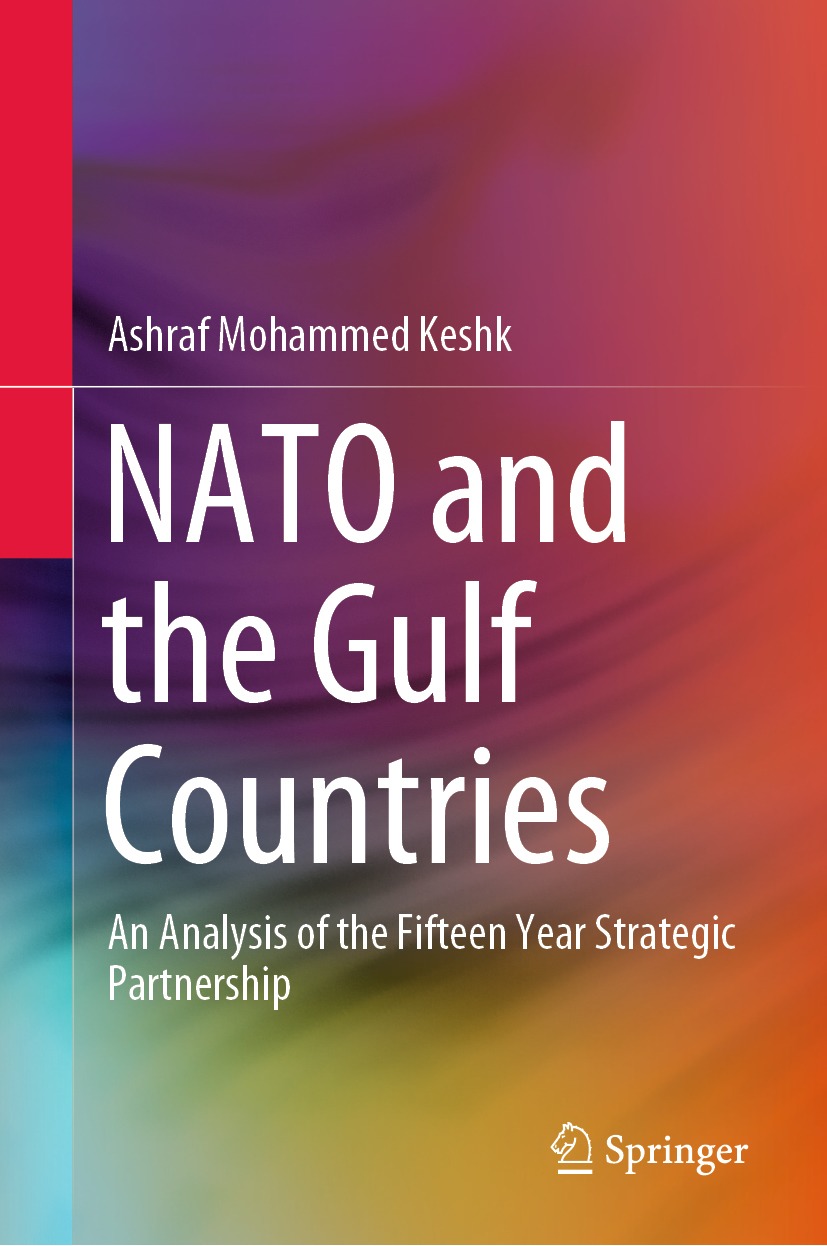Ashraf Mohammed Keshk
NATO and the Gulf Countries
An Analysis of the Fifteen Year Strategic Partnership
1st ed. 2021

Logo of the publisher
Ashraf Mohammed Keshk
Director of the Strategic and International Studies Program, Bahrain Center for Strategic, International and Energy Studies Derasat, Awali, Bahrain
ISBN 978-981-16-3814-5 e-ISBN 978-981-16-3815-2
https://doi.org/10.1007/978-981-16-3815-2
The Editor(s) (if applicable) and The Author(s), under exclusive license to Springer Nature Singapore Pte Ltd. 2021
This work is subject to copyright. All rights are solely and exclusively licensed by the Publisher, whether the whole or part of the material is concerned, specifically the rights of reprinting, reuse of illustrations, recitation, broadcasting, reproduction on microfilms or in any other physical way, and transmission or information storage and retrieval, electronic adaptation, computer software, or by similar or dissimilar methodology now known or hereafter developed.
The use of general descriptive names, registered names, trademarks, service marks, etc. in this publication does not imply, even in the absence of a specific statement, that such names are exempt from the relevant protective laws and regulations and therefore free for general use.
The publisher, the authors and the editors are safe to assume that the advice and information in this book are believed to be true and accurate at the date of publication. Neither the publisher nor the authors or the editors give a warranty, expressed or implied, with respect to the material contained herein or for any errors or omissions that may have been made. The publisher remains neutral with regard to jurisdictional claims in published maps and institutional affiliations.
This Springer imprint is published by the registered company Springer Nature Singapore Pte Ltd.
The registered company address is: 152 Beach Road, #21-01/04 Gateway East, Singapore 189721, Singapore
Acknowledgement
If crises frequently pose challenges, they sometimes present opportunities, but only for those who can wisely use them. Actually, authoring this book coincided with challenging circumstances and a severe crisis which made me indulged in bitter agony. Then, Covid-19 pandemic appeared and widely spread to multiply my discomfort and bitterness, given the restrictions which were imposed on movement. However, I tried to search for a worthy opportunity among all these ruthless circumstances, and I found it when the idea of writing a book came into my mind.
I thank God so much for His generosity and countless great graces, one of which is the support of sincere colleagues who advised me to invest time in writing new book on any subject of my specialization which is the regional security studies. However, the greatest share of appreciation and gratitude is to be expressed for my dear colleague, Amany Abdel-Ghany, an M.A. researcher, at Ain Shams University, in Egypt, as she has exerted great efforts to produce the book in its current form and content. She has done her best to provide the suitable cooperation needed for making use of the most valuable and relevant research papers for this book and has professionally translated all the foreign studies, included here, using profound research tools and methods. Due to her hard work and translation efforts, this book tackled a very worthwhile package of highly significant references. Sincerely, I am very grateful for her cooperation, which was one of the main pillars for accomplishing this book and my Great appreciation to the reviewers who devoted their time to reading the book and provided comments that are an added value to the book, and all thanks and appreciation to the Springer team who were keen to work hard and continuously to publish the Book in this way.
Bahrain 2021
Ashraf Mohammed Keshk
About This Book
On December 16, 2019, Kuwait organized a tremendous celebration for the fifteenth anniversary of launching NATOs Istanbul Cooperation initiative (ICI) which marked a significant step of cooperation with the Arab Gulf states. Representatives from the Alliance and their counterparts from the four Gulf ICI members which have joined the initiative, namely, the United Arab Emirates, Kuwait, Bahrain, Qatar, attended the celebration. In my point of view, that celebration was not just a formal celebration, but rather a straightforward motivation which encouraged me to write this book for five reasons: First, my Ph.D. thesis tackles the Istanbul initiative; I got my Ph.D. in political science from the Faculty of Economics and Political Science, Cairo University, in 2009, with an excellent grade and I was nominated by the faculty as having the best Ph.D. thesis in political science at Cairo University for that year. That is why I am always interested in (ICI) as a subject of study and research. Second, in 2009, I was lucky to have a four-month scholarship at NATO Defense College in Rome, Italy. I say I was lucky because I got that scholarship few weeks after accomplishing my Ph.D., and it was a great opportunity for me to compare what I wrote from textual references to the actual interactions of the Alliances countries, in that ancient college which encompasses representatives of all the NATO members. In addition to that, there are many study programs which are attended by representatives from all the countries which have partnerships with NATO, including the Middle East region and the Arab Gulf Stats. These programs include lectures, seminars, and training courses, as well as periodical publications, issued by the college, with sober studies explaining the implications of the Alliances policies on all the world regions, including the Middle East and the Arab Gulf. Therefore, what this book contains is based on a mixture of academic resources and direct practical experience. Third, I was also lucky that communication with NATO college has never stopped after completing the scholarship; for ten years, from 2009 to 2018, after the scholarship has ended, the college used to invite me to participate, as an academic mentor from the Middle East, in the biannual Crisis Management exercise which is organized for the colleges students. A number of senior armed forces commanders, diplomats from NATO countries and other partner countries in the Mediterranean Dialogue Initiative (1994) and the Istanbul Initiative (2004) used to attend the exercise as well.
Hence, I made use of both the academic and the practical experiences in delivering a comprehensive understanding and assessment of NATOs policies and their impact on the security of the Arab Gulf region. Fourth, I have always been academically interested in regional security, how it affects and be affected by global interactions, as a subject of study, in an endeavor to answer the question: Is regional security a fundamental pillar to achieving global security? Or the vice versa? NATOs engagement with the Gulfs regional security through the Istanbul Cooperation initiative (ICI) was a remarkable step which inspired me to stud the relationship between regional security, as represented by the four GCCs which have joined ICI, and an organization with a colossal size and defensive weight like NATO.

